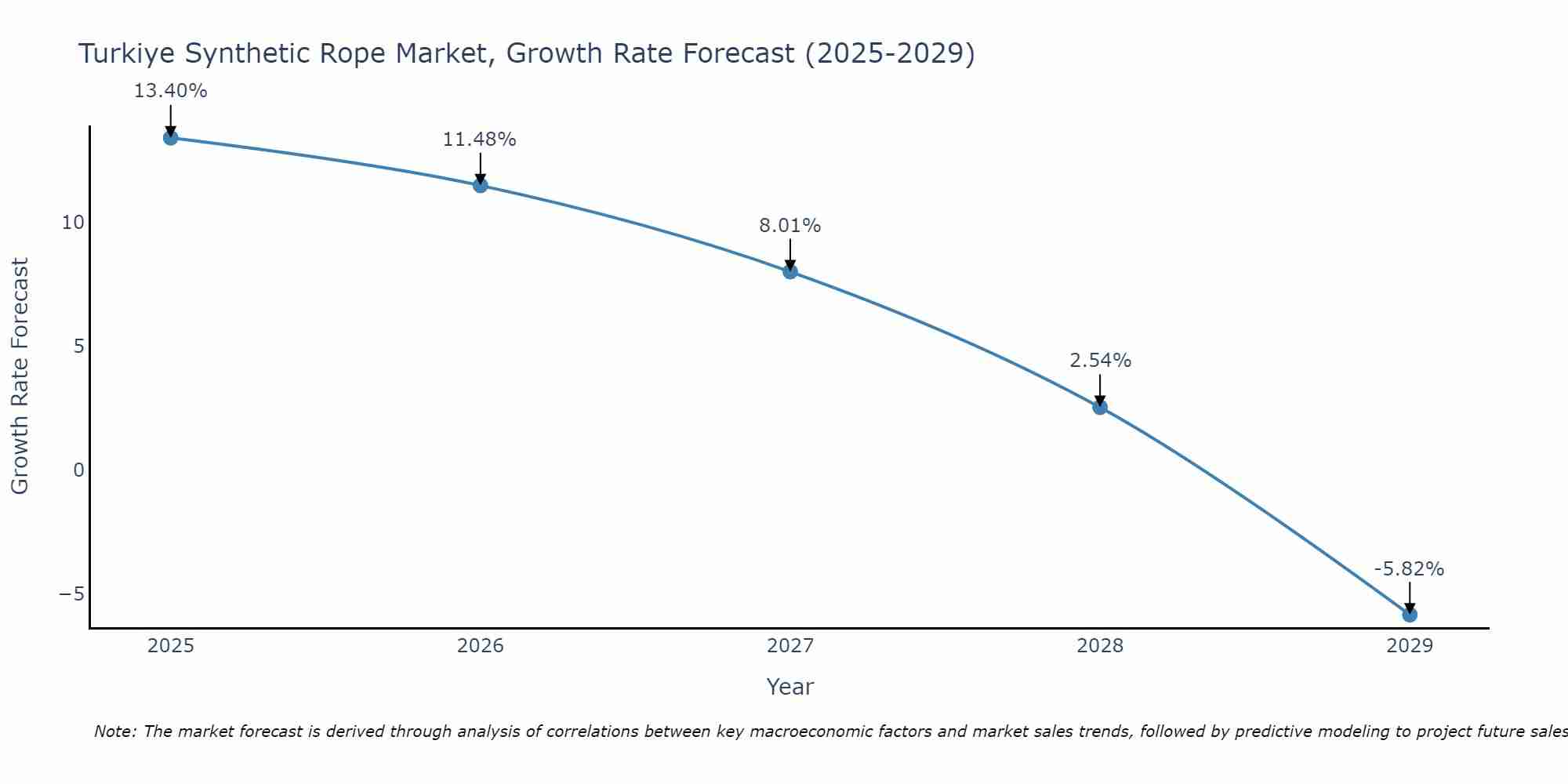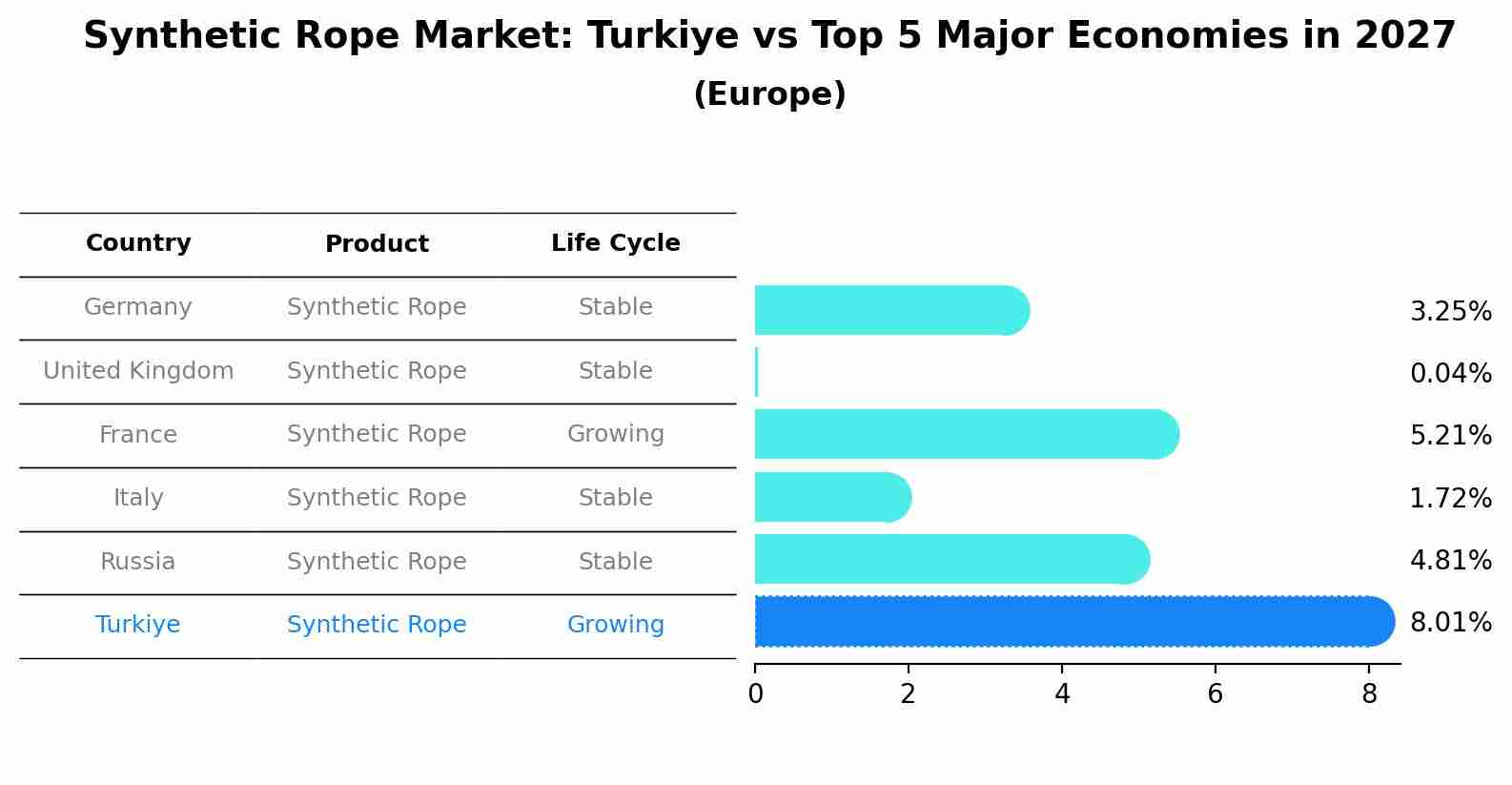Turkey Synthetic Rope Market Outlook | Trends, Analysis, Revenue, Growth, COVID-19 IMPACT, Share, Industry, Forecast, Size, Value & Companies
| Product Code: ETC373778 | Publication Date: Aug 2022 | Updated Date: Jul 2025 | Product Type: Market Research Report | |
| Publisher: 6Wresearch | Author: Sachin Kumar Rai | No. of Pages: 75 | No. of Figures: 35 | No. of Tables: 20 |
Turkiye Synthetic Rope Market Size Growth Rate
The Turkiye Synthetic Rope Market may undergo a gradual slowdown in growth rates between 2025 and 2029. Starting high at 13.40% in 2025, the market steadily declines to -5.82% by 2029.

Synthetic Rope Market: Turkiye vs Top 5 Major Economies in 2027 (Europe)
The Synthetic Rope market in Turkiye is projected to grow at a growing growth rate of 8.01% by 2027, highlighting the country's increasing focus on advanced technologies within the Europe region, where Germany holds the dominant position, followed closely by United Kingdom, France, Italy and Russia, shaping overall regional demand.

Turkey Synthetic Rope Market Synopsis
The Turkey synthetic rope market is experiencing steady growth driven by the increasing demand from the maritime, construction, and industrial sectors. With the rising emphasis on safety and durability, synthetic ropes made from materials like nylon, polyester, and polypropylene are gaining popularity over traditional ropes. The construction industry, in particular, is a key driver of market growth, utilizing synthetic ropes for applications such as lifting, securing, and towing. The maritime sector also presents significant opportunities for market players, with synthetic ropes being preferred for their resistance to corrosion and ability to withstand harsh marine environments. Overall, the Turkey synthetic rope market is poised for further expansion as industries continue to prioritize efficiency, safety, and longevity in their operations.
Turkey Synthetic Rope Market Trends
The Turkey Synthetic Rope Market is experiencing a growing demand for high-performance and durable synthetic ropes, particularly in industries such as marine, construction, and oil & gas. Manufacturers are focusing on developing ropes with enhanced strength, flexibility, and resistance to abrasion and UV exposure to meet the evolving needs of customers. There is also a rising adoption of synthetic ropes over traditional materials like steel due to their lightweight nature, reduced maintenance requirements, and lower risk of corrosion. Additionally, sustainability is becoming a key trend in the market, with a shift towards eco-friendly synthetic rope options made from recycled materials. Overall, the Turkey Synthetic Rope Market is witnessing a shift towards innovative and sustainable solutions to cater to the diverse requirements of end-users across various industries.
Turkey Synthetic Rope Market Challenges
In the Turkey Synthetic Rope Market, some key challenges include intense competition from both domestic and international manufacturers, fluctuating raw material prices, and the need for continuous innovation to meet evolving customer demands and industry standards. Additionally, economic fluctuations and geopolitical factors can impact market dynamics, leading to uncertainty in supply chain management and pricing strategies. Furthermore, ensuring product quality and compliance with regulatory requirements poses a challenge for manufacturers, especially in a market where customer preferences and industrial applications are diverse. Overall, navigating these challenges requires companies in the Turkey Synthetic Rope Market to adopt strategic planning, efficient production processes, and effective marketing strategies to maintain a competitive edge and sustain growth in the industry.
Turkey Synthetic Rope Market Investment Opportunities
The Turkey Synthetic Rope Market presents promising investment opportunities due to several factors. The increasing demand for synthetic ropes across various industries such as marine, construction, oil and gas, and sports, driven by their superior strength, durability, and resistance to corrosion, is a key growth driver. Additionally, the rising focus on safety regulations and standards in workplaces is further fueling the demand for high-quality synthetic ropes. With Turkey being strategically located at the crossroads of Europe and Asia, the country serves as a key market for synthetic ropes in the region, offering ample opportunities for market penetration and growth. Investors can capitalize on these trends by investing in companies that manufacture synthetic ropes, expanding product offerings, improving distribution networks, and leveraging technological advancements to gain a competitive edge in the market.
Jordan Agar Market Government Policies
The government policies related to the Turkey Synthetic Rope Market primarily focus on ensuring product quality and safety standards, promoting innovation and competitiveness in the industry, and supporting sustainable manufacturing practices. Regulations set by agencies such as the Turkish Standards Institution (TSE) mandate adherence to specific technical requirements and certification processes to guarantee the reliability and durability of synthetic ropes. Additionally, government initiatives provide financial incentives and grants to encourage research and development activities aimed at enhancing product performance and reducing environmental impact. Overall, the regulatory framework aims to foster a thriving synthetic rope market in Turkey by creating a conducive environment for businesses to operate efficiently while meeting stringent quality and sustainability criteria.
Turkey Synthetic Rope Market Future Outlook
The future outlook for the Turkey synthetic rope market appears promising, driven by the growing demand for lightweight, durable, and cost-effective alternatives to traditional ropes across various industries such as marine, construction, and mining. Factors such as increasing investments in infrastructure development, rising safety concerns, and the emphasis on reducing carbon footprint are expected to further propel the market growth. Additionally, the advancements in synthetic rope technology, including the development of high-performance materials like aramid and UHMWPE, are likely to expand the application scope of synthetic ropes. However, challenges such as fluctuating raw material prices and competition from natural fiber ropes may hinder the market growth to some extent. Overall, the Turkey synthetic rope market is anticipated to witness steady growth in the coming years, driven by these underlying factors.
Key Highlights of the Report:
- Turkey Synthetic Rope Market Outlook
- Market Size of Turkey Synthetic Rope Market, 2021
- Forecast of Turkey Synthetic Rope Market, 2031
- Historical Data and Forecast of Turkey Synthetic Rope Revenues & Volume for the Period 2018 - 2031
- Turkey Synthetic Rope Market Trend Evolution
- Turkey Synthetic Rope Market Drivers and Challenges
- Turkey Synthetic Rope Price Trends
- Turkey Synthetic Rope Porter's Five Forces
- Turkey Synthetic Rope Industry Life Cycle
- Historical Data and Forecast of Turkey Synthetic Rope Market Revenues & Volume By Material for the Period 2018 - 2031
- Historical Data and Forecast of Turkey Synthetic Rope Market Revenues & Volume By Polypropylene for the Period 2018 - 2031
- Historical Data and Forecast of Turkey Synthetic Rope Market Revenues & Volume By Polyester for the Period 2018 - 2031
- Historical Data and Forecast of Turkey Synthetic Rope Market Revenues & Volume By Nylon for the Period 2018 - 2031
- Historical Data and Forecast of Turkey Synthetic Rope Market Revenues & Volume By Polyethylene for the Period 2018 - 2031
- Historical Data and Forecast of Turkey Synthetic Rope Market Revenues & Volume By Specialty Fibers for the Period 2018 - 2031
- Historical Data and Forecast of Turkey Synthetic Rope Market Revenues & Volume By End Use Industry for the Period 2018 - 2031
- Historical Data and Forecast of Turkey Synthetic Rope Market Revenues & Volume By Marine & Fishing for the Period 2018 - 2031
- Historical Data and Forecast of Turkey Synthetic Rope Market Revenues & Volume By Oil & Gas for the Period 2018 - 2031
- Historical Data and Forecast of Turkey Synthetic Rope Market Revenues & Volume By Sports & Leisure for the Period 2018 - 2031
- Historical Data and Forecast of Turkey Synthetic Rope Market Revenues & Volume By Construction for the Period 2018 - 2031
- Historical Data and Forecast of Turkey Synthetic Rope Market Revenues & Volume By Others for the Period 2018 - 2031
- Turkey Synthetic Rope Import Export Trade Statistics
- Market Opportunity Assessment By Material
- Market Opportunity Assessment By End Use Industry
- Turkey Synthetic Rope Top Companies Market Share
- Turkey Synthetic Rope Competitive Benchmarking By Technical and Operational Parameters
- Turkey Synthetic Rope Company Profiles
- Turkey Synthetic Rope Key Strategic Recommendations
Frequently Asked Questions About the Market Study (FAQs):
- Single User License$ 1,995
- Department License$ 2,400
- Site License$ 3,120
- Global License$ 3,795
Search
Thought Leadership and Analyst Meet
Our Clients
Related Reports
- Afghanistan Apparel Market (2026-2032) | Growth, Outlook, Industry, Segmentation, Forecast, Size, Companies, Trends, Value, Share, Analysis & Revenue
- Canada Oil and Gas Market (2026-2032) | Share, Segmentation, Value, Industry, Trends, Forecast, Analysis, Size & Revenue, Growth, Competitive Landscape, Outlook, Companies
- Germany Breakfast Food Market (2026-2032) | Industry, Share, Growth, Size, Companies, Value, Analysis, Revenue, Trends, Forecast & Outlook
- Australia Briquette Market (2025-2031) | Growth, Size, Revenue, Forecast, Analysis, Trends, Value, Share, Industry & Companies
- Vietnam System Integrator Market (2025-2031) | Size, Companies, Analysis, Industry, Value, Forecast, Growth, Trends, Revenue & Share
- ASEAN and Thailand Brain Health Supplements Market (2025-2031) | Strategy, Consumer Insights, Analysis, Investment Trends, Opportunities, Growth, Size, Share, Industry, Revenue, Segments, Value, Segmentation, Supply, Forecast, Restraints, Outlook, Competition, Drivers, Trends, Demand, Pricing Analysis, Competitive, Strategic Insights, Companies, Challenges
- ASEAN Bearings Market (2025-2031) | Strategy, Consumer Insights, Analysis, Investment Trends, Opportunities, Growth, Size, Share, Industry, Revenue, Segments, Value, Segmentation, Supply, Forecast, Restraints, Outlook, Competition, Drivers, Trends, Demand, Pricing Analysis, Competitive, Strategic Insights, Companies, Challenges
- Europe Flooring Market (2025-2031) | Outlook, Share, Industry, Trends, Forecast, Companies, Revenue, Size, Analysis, Growth & Value
- Saudi Arabia Manlift Market (2025-2031) | Outlook, Size, Growth, Trends, Companies, Industry, Revenue, Value, Share, Forecast & Analysis
- Uganda Excavator, Crane, and Wheel Loaders Market (2025-2031) | Strategy, Consumer Insights, Analysis, Investment Trends, Opportunities, Growth, Size, Share, Industry, Revenue, Segments, Value, Segmentation, Supply, Forecast, Restraints, Outlook, Competition, Drivers, Trends, Demand, Pricing Analysis, Competitive, Strategic Insights, Companies, Challenges
Industry Events and Analyst Meet
Whitepaper
- Middle East & Africa Commercial Security Market Click here to view more.
- Middle East & Africa Fire Safety Systems & Equipment Market Click here to view more.
- GCC Drone Market Click here to view more.
- Middle East Lighting Fixture Market Click here to view more.
- GCC Physical & Perimeter Security Market Click here to view more.
6WResearch In News
- Doha a strategic location for EV manufacturing hub: IPA Qatar
- Demand for luxury TVs surging in the GCC, says Samsung
- Empowering Growth: The Thriving Journey of Bangladesh’s Cable Industry
- Demand for luxury TVs surging in the GCC, says Samsung
- Video call with a traditional healer? Once unthinkable, it’s now common in South Africa
- Intelligent Buildings To Smooth GCC’s Path To Net Zero


















